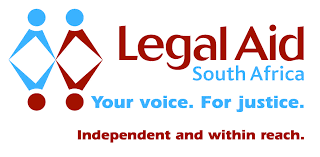Jan 2018
Jan 2018 Estelle Greeff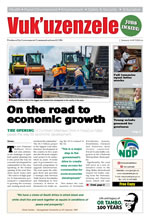
Translations
On the road to economic growth
On the road to economic growth lebangThe opening of Dumisani Makhaye Drive in KwaZulu-Natal paves the way for economic development.
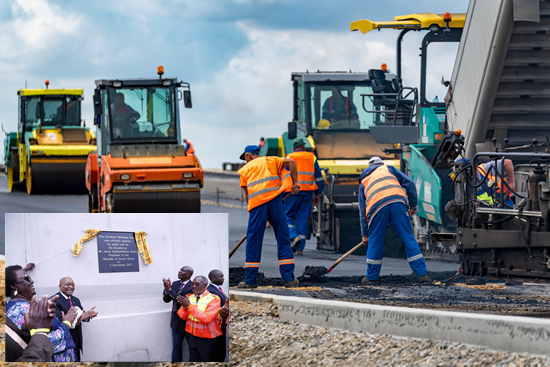 The new Dumisani Makhaye Drive not only addresses the challenge of apartheid spatial planning but it also paves the way for economic development for communities in the area.
The new Dumisani Makhaye Drive not only addresses the challenge of apartheid spatial planning but it also paves the way for economic development for communities in the area.
Speaking at the formal opening of the road President Jacob Zuma said: “The road is of high quality. It demonstrates government’s commitment to growing the economy and creating much-needed jobs in the community.”
The R1.3 billion project is the biggest road infrastructure development in the country in five years and also the most complex road project to be undertaken in years. It forms part of government’s nationwide programme to upgrade infrastructure.
The road spans the uMngeni River and provides a strategic link between Duffs Road in KwaMashu and Dinkelman in New Germany. It shaves 16 kilometres for traffic using the N3 to connect to the N2.
This makes the communities of Newlands, KwaMashu, Inanda, KwaDabeka, Clermont and Pinetown more closely connected.
It is set to ease traffic congestion in the eThekwini Metropolitan Municipality.
Significantly, the road will serve as a new alternative route to the King Shaka International Airport for traffic coming from the Pietermaritzburg and Pinetown areas, which will ease traffic congestion on the N2/N3 interchange.
“This is a major step in the government’s drive to create easy access for communities for socio-economic development,” said the President.
The road has received a stamp of approval from the South African Institution of Civil Engineering, which praised the high standard of engineering techniques that were used without damaging the landscape.
Transport Minister Joe Maswanganyi who accompanied the President, said that the road furthered the Department of Transport’s plans to boost infrastructure development in port areas such as Durban.
The KwaZulu-Natal South African National Taxi Council thanked the government for the road infrastructure as it will improve the industry’s ability to deliver transport services in the metro.
The road is named after the late struggle hero, Dumisani Makhaye, who dedicated his life to the fight against apartheid.
Makhaye was born on 27 March 1955 in Cato Manor, otherwise known as Umkhumbane, in KwaZulu-Natal. In his quest for freedom, Makhaye went into exile to join uMkhonto we Sizwe. He later served his home province as Housing and Agriculture MEC in the KwaZulu-Natal Provincial Executive Council.
Makhaye served the KZN Cabinet from 1999 to 2004.
The launch of the road is part of the KwaZulu-Natal provincial government’s Roads Naming and Renaming Legacy Project. The project aims to help communities reclaim their historical legacy, pride and heritage.
CACH - helping to make education dreams a reality
CACH - helping to make education dreams a reality lebangFinishing matric can be a scary time for youngsters but government has a number of programmes in place to assist school leavers.
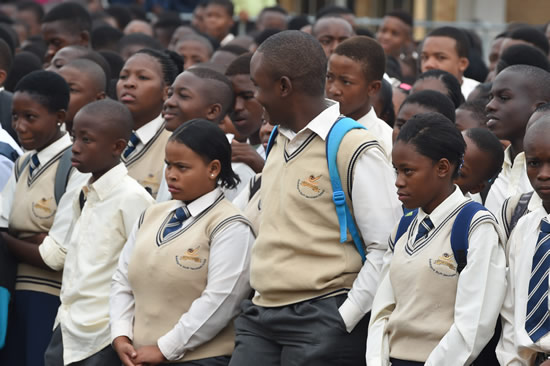 Matrics across the country have received their results and are now looking to take the next big step towards furthering their education.
Matrics across the country have received their results and are now looking to take the next big step towards furthering their education.
Applying to post-school institutions can be a struggle for many of these youth who sometimes spend hours waiting in queues around the country, only to have their applications turned down.
But being declined should not be seen as the end of the road. – Government’s Central Application Clearing House (CACH) was developed to help young people such as this to reach their education dreams.
Due to space restrictions, it is an unfortunate reality that thousands of university and college applications are turned down every year. This is why, in 2012, the Department of Higher Education and Training (DHET) established CACH which is an online service designed to help students find spaces in the post-school education and training system.
CACH services are regarded as useful for applicants who applied for admission to a university or college in time‚ but have not been offered a place or their programme of choice.
The service can also be useful to prospective students who achieved better matric results than expected and have changed their minds and now want to pursue a different university, skills development or technical and vocational education and training course to the one for which they first applied.
Looking for a second chance?
Looking for a second chance? lebangGovernment’s Second Chance Matric Programme gives free academic support to learners who were not able to obtain a matric certificate.
 It was created by the Department of Basic Education and the following people can apply:
It was created by the Department of Basic Education and the following people can apply:
- Supplementary Exam Candidates: Learners who wrote the National Senior Certificate (NSC) the previous year. They qualify to write a maximum of two subjects to meet the requirements of the NSC exams which are written in February and March after 12 hours of face-to-face classes.
- Progressed Learners: Learners who wrote the NSC but did not sit for all six subjects and who will write exams for the outstanding subjects in June. Learners are supported by 30 hours of face-to-face classes before the exams.
- Senior Certificate (amended) exam candidates: Learners registered to write the Senior Certificate exams in June. Thirty hours of face-to-face classes will take place.
- NSC exams part-time candidates: Learners who attempted the NSC exams post-2013 and will write exams in November. Thirty hours of face-to-face classes will take place.
The programme also incorporates educational television and radio broadcasts, online courses and printed resources.
Learners can apply at their nearest education district office.
For more information visit www.education.gov.za or call 0800 20 29 33.
Road safety is everyone’s business
Road safety is everyone’s business lebangIn the previous edition of Vuk’uzenzele, we began sounding a call to all our communities to work with government and emergency services to minimise the incidents associated with the December holiday season.
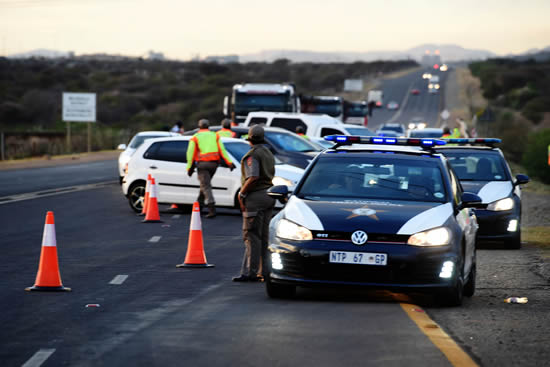 In particular around this time, our country sees a marked increase in road accidents, crime, drowning, injuries as well as deaths, particularly on our roads. This period is generally one of the busiest for our emergency and law enforcement agencies. We have therefore directed our road traffic officers and police to step up safety operations to ensure that people are safe everywhere in South Africa.
In particular around this time, our country sees a marked increase in road accidents, crime, drowning, injuries as well as deaths, particularly on our roads. This period is generally one of the busiest for our emergency and law enforcement agencies. We have therefore directed our road traffic officers and police to step up safety operations to ensure that people are safe everywhere in South Africa.
Our law enforcement teams will be visible and in full force during the festive season. There will be zero tolerance for road users who drive recklessly or are negligent and drive at excessive speeds. Mobile testing stations will be placed at strategic points to test the roadworthiness of vehicles travelling to major destinations.
In addition, there will be highly visible traffic law enforcement patrols on all known hazardous routes, while roving law enforcement operations in hotspots including built-up areas such as suburbs, townships and villages will be carried out.
Government will be undertaking these extra measures because we know that irresponsible and reckless driving destroys lives and road fatalities are a major concern.
Every year 1,3 million people die world wide as results of road accidents, with people between the ages of 20 and 34 constituting the majority of the fatalities. The South African Government is therefore steadfast in its commitment to reduce road fatalities this season which remain unacceptably high.
We would like to once again appeal to all our road users to be considerate and save lives by being alert and do not drive recklessly. We urge you to ensure that your vehicle is roadworthy and obey the rules of the road at all times. Roadworthy vehicles mean safer journeys and it is important that you undertake a pre-trip inspection of the vehicle before embarking on a journey.
Let us make road safety everyone’s business. We call on South Africans to take responsibility for themselves and others while driving. We also call on road users to report those who drive recklessly and dangerously.
By working together we can ensure that our roads are safer for all. All passengers should wear seatbelts and children must be put in child restraints or child seats. Government is also committed to getting our youth involved in ensuring safer roads as we believe that road safety education from an early age is essential in turning the tide against road carnage.
Let us together make our roads safer this festive season, and protect our lives and those of other road users.
I wish you and your families a happy and safe festive season, filled with warmth, laughter and good memories.
May you also have a Merry Christmas and a Happy New Year!
Did you know
Global trends show that up to 1,3 million people die on the roads each year with young people between the ages of 20 and 34 constituting the majority of fatalities
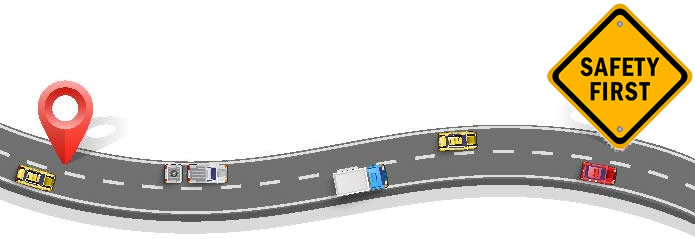
Mbombela’s cool approach to climate change
Mbombela’s cool approach to climate change lebangLocal government
Mpumalanga’s capital city is being proactive when it comes to managing changing.
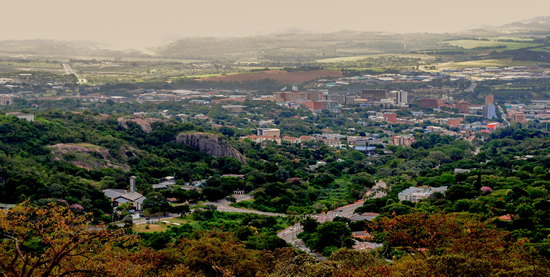 The Mbombela Local Municipality in Mpumalanga is becoming an environmental pioneer amongst local municipalities, by developing strategies on how to deal with one of the biggest ecological threats facing South Africa: climate change.
The Mbombela Local Municipality in Mpumalanga is becoming an environmental pioneer amongst local municipalities, by developing strategies on how to deal with one of the biggest ecological threats facing South Africa: climate change.
Mbombela has made it clear that it wishes to become a more environmentally friendly city by investing in green initiatives. Having realised the increasing impact of global warming, the municipality approached environmental management consultants SRK Consultants to develop a climate change strategy and implementation plan.
“The strategy is meant to guide and equip the city to build climate resilience and improve the community’s ability to adapt,” said Khethiwe Malaza, head of the city’s Environmental Management Unit.
SRK Consulting applied its rapid vulnerability assessment (RVA) tool, a pioneering method which has huge potential to assist local governments in responding to climate change.
The tool is guided by the Department of Environmental Affairs’ “Let’s Respond Toolkit”, which helps municipalities to include climate change responses into their integrated development plans.
“The development of a comprehensive policy and strategy will enable the municipality, business and civil society to effectively respond to climate change pressures, risks and opportunities. This will allow us to make green investments and provide guidance on future development,” Malaza said.
The RVA tool assesses various regions and their exposure to climate change, as well as the potential economic and social impacts. SRK Consulting environmental scientist Warrick Stewart said that the tool takes various factors into account:
- including exposure (how exposed the area is to climate change).
- sensitivity (how sensitive the area is to climate change)
- adaptive capacity (how well the area would be able to cope and adapt to climate change).
According to Malaza, the tool will assist the municipality with the biggest climate change threats to the area – floods and drought.
“Heavy rainfall will bring floods to the city, which could lead to an outbreak of dysentery diseases. The economy of the city relies heavily on both the agriculture and tourism sectors. In a case of drought, these two sectors will be most affected,” said Malaza.
Amongst the assessment’s findings, it was found that children, the sick and the elderly are most vulnerable to climate change. Rural areas will be most heavily impacted, while outdated infrastructure in certain areas makes them far less able to cope.
“We are already using the findings to inform actions we should take in our climate change response strategy,” he said.
 What is climate change?
What is climate change?
A human-driven change in global or regional climate patterns, first apparent from the mid to late 20th century. The earth’s average temperature has risen by almost one degree Celsius since 1950, largely due to increased levels of carbon dioxide produced by the use of fossil fuels.
Swartland powers energy efficiency
Swartland powers energy efficiency lebangLocal government
Swartland Municipality scooped the greenest municipality award at the recent Greenest Municipality competition (GMC).
 The awards are hosted by the Department of Local Government, Environmental Affairs and Development Planning.
The awards are hosted by the Department of Local Government, Environmental Affairs and Development Planning.
The Municipality walked away with R130 000 in prize money.
The GMC aims to promote improved service delivery that restores community pride and a commitment to caring for the living environment.
It also focuses on improved integrated sustainable development strategies in municipalities and serves to improve service delivery by municipalities to communities.
In 2016/17, Swartland Municipality invested over R200 000 in energy efficient light emitting diode (LED) streetlights to replace existing inefficient mercury vapour and high pressure sodium streetlights.
LEDs are extremely energy efficient and consume less power than other light bulbs.
“We celebrate the constant hard work which makes our towns function; we celebrate the passion of officials who carry out work against challenging odds and we celebrate the spirit of co-operation and the efforts to use our resources wisely for the benefit of all our citizens,” said Minister of Local Government, Environmental Affairs and Development Planning Anton Bredell, at the awards event.
Minister Bredell said that municipalities are central to the success of any initiative that seeks to address the challenges of climate change and resource inefficiencies.
This year the main category winners were Overstrand Municipality (awarded R70 000 for coming second) and Hessequa Municipality (R50 000 for coming third).
In the district municipalities category, the winner was Eden District Municipality, which walked away with R130 000. Second was Overberg District Municipality (R70 000) and third the West Coast District Municipality (R50 000). The municipalities will use their winnings for community development projects.
2018 Central Application Clearing House (CACH)
2018 Central Application Clearing House (CACH) lebangCACH is a Department of Higher Education and Training service to assist young people by providing career advice and support.
 What is the Central Application Clearing House?
What is the Central Application Clearing House?

The Central Application Clearing House (CACH) was created by the Department of Higher Education and Training to assist prospective students who want to enter the Post-School Education and Training (PSET) System but might be facing a situation whereby they:
- Applied on time to their institution of choice but their application was declined and now it is too late to apply elsewhere.
- Did not apply because they did not meet the entry requirement based on their Grade 11 results but find that their Grade 12 results meet the entry requirements.
- Did not apply on time for one reason or the other or did not apply at all.
- Have no clue what to study after completing matric.
- Have an idea what to study but are not sure if their choice of study is right for them.
Services offered by CACH
- Applications for PSET learning opportunities (universities, universities of Technology, technical and vocational education and training colleges and Sector Education and Training Authorities.
- Information about financial aid.
- Career development services (guidance, information, advice and career planning/information on funding and financing options).
- Artisan support (National Artisan Development Support Centre).
The CACH service starts on 3 January 2018, shortly before the NSC examination results are released, and will operate until the end of
February 2018.
How does CACH work?
Phase 1: Students who have not received an offer of a space by the institutions they have applied for, or who are looking for PSET learning opportunities, can contact CACH via a toll free number (call 0800 356 635), the website (www.dhet.gov.za) or via a standard SMS (SMS name and ID to 49200) or they can register online. You can also find out more on their via Facebook page which is (CACH_SA)
Phase 2: The agents will call a prospective student back free of charge, from the contact centre and register all requested details on the CACH database, indicating the learner’s chosen field of study and the province they wish to study in.
Phase 3: The applicant’s personal details and matric results will be verified and automatically transferred to institutions of higher learning for possible admission and placement.
Phase 4: The CACH service will verify the learner’s information and forward it to institutions that still have available places. Where places exist and applicants meet the requirements, institutions will contact applicants directly to offer them available places.
Points to note
- CACH cannot guarantee any applicant a space to study.
- CACH cannot determine when the institutions will contact the applicant for possible placement.
How does CACH assist applicants who are not sure of what to study or those who do not meet the requirements to enter the PSET system?
The CACH service works in collaboration with the National Career Development Services (CDS) which assists in providing comprehensive career information and advice on:
- Careers & learning pathways
- Subject choice.
- Information on supplementary exams
- Matric upgrades.
- Study opportunities offered by the PSET system.
- Funding and financing options
- Information on applications processes and closing dates.
- Second semester application and registration dates.
Anyone who is interested in the services offered by CDS may contact the CDS Helpline through the following channels:
- SMS your question or send a ‘please call me’ to 072 204 5056, or
- Call 086 999 0123, which is a call share line, from Monday to Friday between 8:00am and 4:30pm,
- Email careerhelp@dhet.gov.za,
- Visit the office of the CDS at 123 Francis Baard Street, Pretoria,
- Facebook at www.facebook.com/careerhelp, or
- Twitter at www.twitter.com/rsacareerhelp
Government funding opportunities?
There are different funding opportunities available for studies at higher institutions of learning. These are offered by: Funza Lushaka Bursary Scheme, National Student Financial Aid Scheme, the Rural Education Access Programme, Department of Social Development, Department of Science and Technology and Department of Health.
Who should apply for the financial aid?
South African learners who would like to study at higher institutions of learning are invited to visit the Financial Aid Office at the institution of their choice.
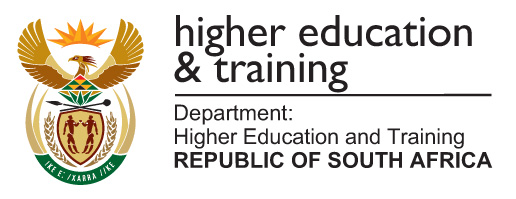
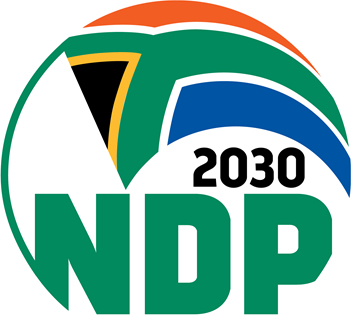
Full tummies equal better marks
Full tummies equal better marks lebangThe National School Nutrition Programme feeds millions of children across the country and is paying off.
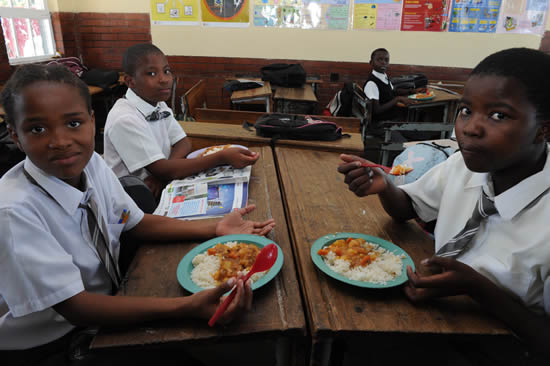 More than nine million learners across South African public schools are tucking into their school work thanks to a government programme that ensures their bellies are full of nutritious food. Through the National School Nutrition Programme (NSNP) the Department of Basic Education (DBE) has exceeded its goal of providing meals to about 75 percent of the country’s learners.
More than nine million learners across South African public schools are tucking into their school work thanks to a government programme that ensures their bellies are full of nutritious food. Through the National School Nutrition Programme (NSNP) the Department of Basic Education (DBE) has exceeded its goal of providing meals to about 75 percent of the country’s learners.
NSNP director Neo Rakwena said 20 619 schools prepare and serve school meals to approximately 9 032 622 learners across the country each day.
“Many children come from poor households that struggle to put food on the table, and for some learners, the school meal is the only meal they have in a day. School meals contribute to learning capacity, concentration and class participation,” she said.
She said schools that have been excluded from the programme should approach district offices if they want to come on board.
In the 2015/16 financial year, about R5 703 billion was allocated to the programme.
Rakwena said the amount spent on the programme is adjusted annually to cover inflation, and the budget for 2017/18 is around R6.4 billion.
The programme intends to alleviate short-term hunger and contribute to the well-being of learners.
School enrolment and learner attendance are also improving as a result of the feeding programme.
Recently, Cabinet approved the publication of the Report on the Evaluation of the NSNP compiled by the Department of Planning, Monitoring and Evaluation (DPME). It outlines successes and steps that can be taken to improve the initiative.
DPME Director for Evaluation Jabu Mathe, said the main aim of the evaluation was to assess whether the NSNP is being implemented in a way that is likely to result in significant health and education benefits for learners.
He reiterated that the overall aim of the programme is to improve the health and nutritional status of the poorest learners in South Africa. The programme targets all learners in quintile 1 to 3 public schools, which equates to 60 percent of the poorest schools in South Africa.
The programme also helps with alleviating poverty in communities through job creation.
“The evaluation found that the NSNP provides opportunities to over 50 000 voluntary food handlers annually to cook for learners, and they earn a stipend of R960 per month,” said Mathe.
“This translates to R576 million a year in stipends which benefit community members.”
The programme also stimulates economic activity as small, medium and micro-enterprises and co-operatives benefit as service providers in those provinces with decentralised procurement (KwaZulu-Natal, Gauteng, Mpumalanga and the Northern Cape).
“Local sourcing of vegetables has the potential to benefit schools and communities and stimulate local agriculture.” The report also revealed that the Western Cape, Mpumalanga, Gauteng, Eastern Cape, Northern Cape and North West provinces have best implemented the programme over the years.
 National School Nutrition Programme in numbers
National School Nutrition Programme in numbers
- 75 percent – the number of learners receiving meals through the NSNP.
- 20 619 schools prepare and serve school meals to over 9 million learners across the country.
- Over 50 000 jobs created for voluntary food handlers.
For more information visit www.education.gov.za
Classroom overcrowding brought to book
Classroom overcrowding brought to book lebangThe Gauteng Department of Education has opened a new school that will help ease learner influx pressure.
The newly-built state-of-the-art Seshegong Secondary School in Olievenhoutbosch, Centurion, will help alleviate classroom congestion.
The school will cater for 1 200 children from grades eight to 12. Because of its size, it is classified as a mega school designed to respond to the province’s demand trends.
Gauteng Education MEC Panyaza Lesufi said the school is a modern information technology-based facility that incorporates the Department of Education’s National Schools Infrastructure Norms and Standards.
According to the department a success of the project has been the increased involvement of the community in the planning, implementation and ongoing management of the facility.
“The impact the project has had on the beneficiary community has been remarkable. Its success cannot be measured merely in direct benefits, such as the number of buildings erected, but rather the human benefit that the community has derived from being part of the process.”
A total of 2 110 people were employed during construction, including contractors, and at least 31 subcontractors were used.
The school’s smart classrooms are connected to a Wi-Fi network that allows students to make use of the internet. It is also fitted with an intercom system, CCTV cameras and an alarm system.
The facility complies with the latest Green Building practices and the water system uses solar water heating. To mitigate water usage, rainwater is harvested and used for irrigation and to flush toilets, which reduces the usage of council water.
To boost security at the school, a guard house has been built, security steel meshes have been installed and a clear view fence divides the school area and sports field.
MEC Lesufi pleaded with the community to “protect this school for many generations”.
“We will continue to open such schools every month until 2019 in our quest to change the face of township schools,” he said.
Northern Cape’s heaven-sent opportunity
Northern Cape’s heaven-sent opportunity nthabiThe Square Kilometre Array radio telescope has changed the face of a small Karoo town.
 Major developments are set to take place in Carnarvon in the Northern Cape when scientists and researchers from across the world flock to the small town for the Square Kilometre Array (SKA) radio telescope.
Major developments are set to take place in Carnarvon in the Northern Cape when scientists and researchers from across the world flock to the small town for the Square Kilometre Array (SKA) radio telescope.
“Hundreds of scientists are going to come to use the telescope and they will need to be supported, to be accommodated, to be looked after and we are going to need appropriate facilities for them so there is immense opportunity,” said Science and Technology Minister Naledi Pandor.
The minister was addressing a community imbizo to engage residents on issues relating to science and technology and the socio-economic challenges they face.
She also took stock of community development initiatives led by SKA South Africa and how they had improved the lives of community members.
Carnarvon, Williston and other surrounding towns would benefit from educational and economic opportunities once research commences at the radio telescope.
Dingaan Baartman, a beneficiary of the project is part of the maintenance team at the SKA and is making the most of the opportunity.
"This programme helped me a lot. It taught me a lot about the electrical side," he said.
The SKA is supported by 10 member countries – Australia, Canada, China, India, Italy, New Zealand, South Africa, Sweden, the Netherlands and the United Kingdom.
The project has brought together some of the world’s finest scientists, engineers and policy makers and more than 100 companies and research institutions from across 20 countries in the design and development of the telescope.The construction of the SKA is set to start in 2018, with early science observations in 2020.
The SKA will be the biggest radio telescope in the world and it will position the Northern Cape as a knowledge hub for astronomy research.
“Scientists will use the SKA to try and understand how the universe evolved, how stars and galaxies form and change, as well as unravelling the mysteries of ‘dark matter’ and ‘dark energy’.”
Minister Pandor said government is committed to creating conditions for a better life for South Africans.
“Government cannot work without your support. We need you as partners in mobilising society for change, in mobilising for a better life for all.”
On the road to global glory
On the road to global glory nthabiA new road has brought hope to the community of Carnarvon and surrounding are
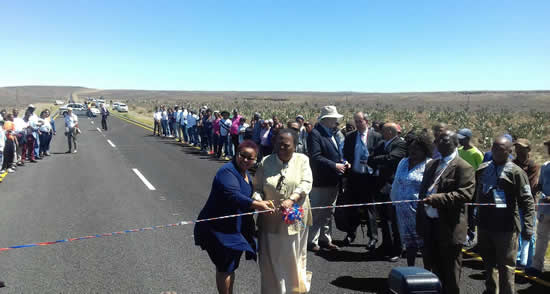 A new R200 million, 80 km stretch of road that leads to the site of the MeerKAT radio telescope is significant for community development.
A new R200 million, 80 km stretch of road that leads to the site of the MeerKAT radio telescope is significant for community development.
Science and Technology Minister Naledi Pandor unveiled the road built near the small town of Carnarvon in the Karoo during a visit to the MeerKat and Square Kilometre Array (SKA) site.
The MeerKAT radio telescope project is a precursor to the SKA which, on completion, will be the biggest radio telescope in the world.
Minister Pandor said the road has created work opportunities for the community.
“This will be a very important route for world researchers so we have to ensure that we have appropriate infrastructure,” she said.
Government and the province have accelerated infrastructure initiatives that will benefit the larger community.
“So all the surrounding towns have been and will be beneficiaries of this infrastructure.”
Communities will benefit through better education and training, investment in small businesses as well as social and technological development.
The minister said the support received from the provincial government since the inception of the SKA project had been exceptional.
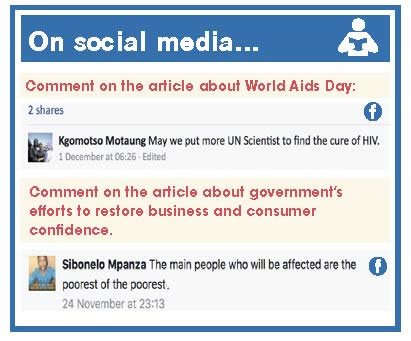 Local contractor Gert Neels, whose company built the road, said the project has made a difference to the livelihoods of locals who got work experience during the project.
Local contractor Gert Neels, whose company built the road, said the project has made a difference to the livelihoods of locals who got work experience during the project.
The SKA has brought with it a number of other benefits too.
For the first time, global infrastructure is located in Africa. “Major research initiatives are undertaken in Europe or in the United States or other parts of the world.
“ Rarely do you see research of global importance done on the African continent. So we are placing Africa on the global scientific map and that is very important.”
Minister Pandor said the MeerKAT has attracted over 500 research groups from 45 different countries.
“Because we are launching research infrastructure of this kind, we are going to train new engineers, new astrophysicists, mathematicians in Africa and IT specialists because all these domains are absolutely important for a research sector of this kind,” she said.
SKA boosts electrical engineering training in N Cape
SKA boosts electrical engineering training in N Cape nthabiA new training centre is helping the youth of Carnarvon to reach for the stars.
 The recently-opened Klerefontein Training Centre, situated near the site of the Square Kilometre Array (SKA) project in the small Karoo town of Carnarvon, is giving local high school learners the opportunity to become qualified electrical engineers.
The recently-opened Klerefontein Training Centre, situated near the site of the Square Kilometre Array (SKA) project in the small Karoo town of Carnarvon, is giving local high school learners the opportunity to become qualified electrical engineers.
Opened in May, the centre offers an accredited electrical engineering apprenticeship.
The South African Radio Astronomy Observatory (SARAO) initiated the artisan bursary programme in 2011. The training programme is aimed at providing the MeerKAT and SKA radio telescopes with qualified artisans for their operations and maintenance.
Klerefontein Training Centre education training and development practitioner Albert Brand explained that the centre trains high school learners from Carnarvon and the surrounding towns as artisans and makes them job ready.
The centre recently received accreditation that establishes it as a facility that offers training and academic qualifications.
“We have already had six learners receiving their electrical engineering qualifications. For these learners to reach this level of training is excellent.
“If you look at the socio-economic challenges in Carnarvon, this programme will be good for the young people here,” he said.
Jolene George (22) who is from Carnarvon, started the training programme immediately after matric.
“I am here for job training. I started at the SKA office in Cape Town for three months before I came to Klerefontein,” she said.
Once she completes the training programme, she will decide whether to try get into SKA or study further.
To become a qualified artisan, students must complete several theory courses, followed by eight months of practical training at an accredited facility. Thereafter, students are required to complete 18 months of on-the-job training, before they can write their trade test.
The Klerefontein Training Centre was established to provide the practical training component of the qualification. It focuses on training electrical artisans, which is currently the most urgent trade required by the MeerKAT and SKA project. In time it may be expanded to accommodate other trades.
The training centre consists of a technical training workshop and a fully-equipped classroom.
The centre is partly accredited by the National Artisan Moderation Board (NAMB). The accreditation will be finalised once NAMB completes its final inspection.
Having a training centre in the Karoo region has significantly reduced the cost involved in training electrical artisans, because these students no longer need to be accommodated at facilities located in Gauteng and elsewhere.
In addition, training the students on-site provides the opportunity for them to complete their on-the-job training at the SARAO facility.
Young minds groomed for greatness
Young minds groomed for greatness nthabiA fledging scientist is using his passion for maths and science to empower learners in Carnarvon.
When Itumeleng Molefi (27) decided to take a gap year in 2013 after completing his Bachelor of Sciences Degree in Pure and Applied Mathematics and Honours in Physics, he did not think he would find himself changing lives in a small Karoo town.
Molefi, who comes from Barkly West near Kimberley in the Northern Cape, was supposed to pursue a Master of Physics Degree but decided to take a break and instead joined Teach South Africa, which looks for graduates who are able to teach maths and science, technology and English.
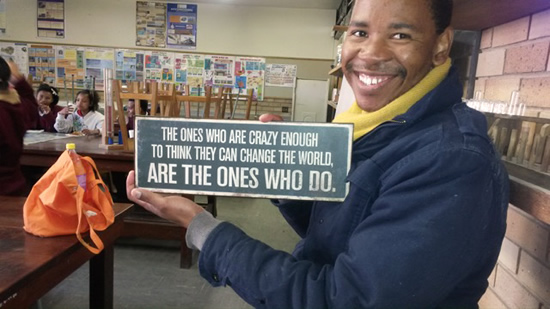 “I was supposed to do a Master’s Degree in 2013 but because I had a difficult year in [2012], I decided to take a break. I joined an organisation called Teach South Africa.”
“I was supposed to do a Master’s Degree in 2013 but because I had a difficult year in [2012], I decided to take a break. I joined an organisation called Teach South Africa.”
Although he was supposed to be posted in Witbank, Mpumalanga, he opted instead to head to Carnarvon because he would be closer to home.
Carnarvon is an isolated town over four hours from Kimberley and nearly eight hours from Cape Town. The former mission station is the closest town to the science and astronomy hub that is forming in the central Karoo region where the Square Kilometre Array (SKA) is taking shape.
As a high school student, he began applying for an SKA scholarship but it was only when he started his Honours that he was successful.
Spending his gap year in Carnarvon doing something meaningful was thus a natural fit for Molefi, whose dream it was to shape minds as an educator.
Teach South Africa uses a model adopted from an international programme called Teach America which seeks to train professionals who do not have a teaching qualification.
Despite his mother tongue being Setswana Molefi found himself having to teach in Afrikaans at Carnarvon High School.
Molefi said the four years he has spent teaching physics at Carnarvon High School have been fulfilling. And he has certainly made his mark. After settling in, he urged learners to think out of the box and subsequently encouraged them to enter the Eskom Expo for Young Scientists, which is a platform that offers hundreds of learners an annual opportunity to represent their schools and showcase their scientific ideas.
In 2016, Molefi and another colleague guided 12 learners through the entry process and then were able to stand back with pride when they scooped a silver and bronze medal for social sciences and computer science projects respectively.
This year, the school won four bronze medals for various projects.
Despite his learners not taking gold, Molefi is happy that they consistently receive podium positions and, more importantly, he is satisfied that he has changed how science is taught at the school by making it more relevant and less intimidating for the learners.
Free State accelerates fight against fraud and corruption
Free State accelerates fight against fraud and corruption nthabiThe Free State government is boosting efforts to fight corruption in the province
The Free State Provincial Treasury has partnered with the private sector to fight corruption in the province.
The partnership involves the University of the Free State, Association of Certified Fraud Examiners (ACFE), Price Waterhouse Coopers (PWC), Standard Bank and the provincial treasury.
MEC Elsabe Rockman expressed that it is important to raise awareness and promote knowledge on fraud and corruption.
“These tools must be balanced and strengthened by our consequence management actions. We must achieve a balance between our proactive and reactive measures,” she said.
The MEC said that an environment of ethical governance which minimises the need to redirect increasingly limited financial resources to investigate possible fraudulent transactions and collusion between the public and private sector can be created through such a partnership.
“Behind every fraudulent scheme or act, there are real people who suffer the consequences.”
The provincial treasury has implemented a headcount programme in all provincial departments.
“The main aim of the programme is to physically verify the existence of officials appointed and paid through the PERSAL system and to clean up the supplier base system.”
Rudolph Laubscher from ACFE stressed the culture of honesty, ethical behavior and an appropriate tone by top managers in both government and the private sector. According to Laubscher these three requirements are important to navigate the challenges associated with the prevention and detection of fraud and corruption.
Dr Henk Boshoff Provincial Head at the Public Service Commission said government has stepped up its anti-corruption activities.
“Its efforts have become more systematic, with greater emphasis on instituting appropriate policy measures to prevent corruption,” he said.
Elite units to curb crime
Elite units to curb crime nthabiSpecialised crime-fighting and tracking units are back to end criminals reign.
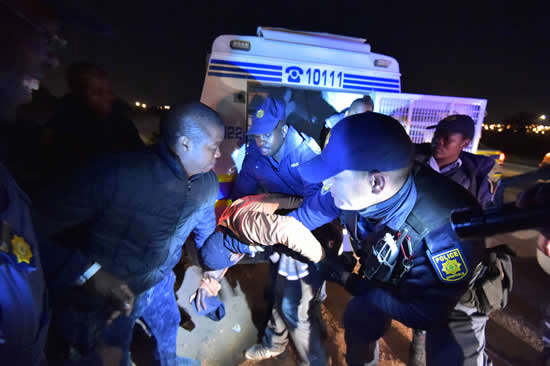 Now that Police Minister Fikile Mbalula has relaunched the SAPS’s Tactical Response Team (TRT) and tracking teams, criminals have nowhere to hide.
Now that Police Minister Fikile Mbalula has relaunched the SAPS’s Tactical Response Team (TRT) and tracking teams, criminals have nowhere to hide.
The TRT and tracking teams’ main aims are the prevention and combating of crime in hotspots and the capturing of escaped criminals and elusive suspects.
Minister Mbalula resuscitated the tracking units, which have teams countrywide, to augment visible policing and TRT efforts. The teams track, locate and facilitate the apprehension of perpetrators of crime, especially those involved in serious and violent crimes, such as the killing of police officials.
“There will be chopper drops, roadblocks and stop and searches; we will saturate key crime hotspots and other top-secret methods will be used to do our best to give our people their country back by force,” he said.
Minister Mbalula has assured the public that both teams will go after dangerous criminals.
“We have chosen the finest, bravest and most highly-skilled men and women in our police service to join these elite units to assist in combating these threats to our lives,” he said.
Minister Mbalula said that although the TRT would be targeting crime hotspots, it would be visible all over the country.
“These teams are ready and capable; they are well resourced.”
There are 27 units in all nine provinces: three in Western Cape and four teams each in Gauteng, Eastern Cape and the North West. Limpopo and Northern Cape have one each while there are six units in KwaZulu-Natal, tasked with ending high-risk political killings.
Serious crimes reported at police stations would be elevated to the TRT members, who were retrained to deal with medium to high-risk crime, such as hijackings and aggravated robberies. The stations will continue with normal service delivery duties. If the crime is more serious, it will be escalated to the cluster, where the operations command centre will deploy teams to deal with it.
Minister Mbalula also warned police officers involved in criminal activities that they will face the full might of the law. He added that through enhanced police visibility, the SAPS is going to make major inroads in decreasing the levels of serious crime. A medium-term target to reduce the number of serious crimes reported, from 1 788 139 in 2015/16 to 1 587692 in 2019/20, has been set.
Minister Mbalula urged the community to report crime and not to buy stolen and counterfeit goods.
FS community gets treatment plant
FS community gets treatment plant nthabiAn innovative sewage treatment project has brought hope to the community of Glen in the Free State. partnership between South Africa and China has resulted in a specialised sewage system for the community of Glen in the Free State.
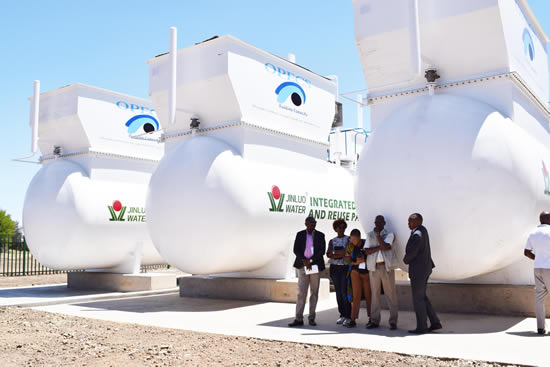 The R25 million project will improve the state of water for the community.
The R25 million project will improve the state of water for the community.
MEC for Agriculture and Rural Development Oupa Khoabane said the previous plant discharged poor quality water into the Modder River, which impacted the quality of life of the 1 400 community members.
“This project seeks to address challenges posed by the old sewage system, such as a failure to handle the growing population in our communities,” said MEC Khoabane.
Although the water from the water treatment plant can be used for construction, irrigation and cleaning, tests are still under way to determine if it is safe for consumption.
“Now there won't be any bad smells and everybody will be healthy.”
The Packaged Sewer Treatment Plant operates with sludge process reduction activated sludge technology which was developed and patented in China.
The system is compact and portable and has a back-up generator to ensure that it runs smoothly even without electricity.
According to Taka Chiwanza, an engineer at the agriculture department, the system is low maintenance and innovative as it does not require chemicals.
“In the new system, each unit treats 150 m3 per day, meaning it gives us a capacity of 450m3 daily, which caters for the whole population of Glen,” said Chiwanza.
Nonkosi Nzabe, who is a student at Glen College of Agriculture, is happy about the new plant.
“Now there won't be any bad smells and everybody will be healthy. The students suffered the most because we were so close to the sewage works,” said Nzabe.
Tugs make waves in SA ports
Tugs make waves in SA ports nthabiAn extensive fleet replacement programme is tugging South Africa’s Oceans Economy in the right direction.
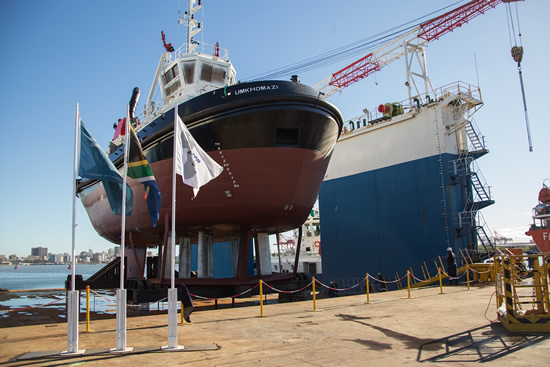 Transnet National Ports Authority (TNPA) has launched the seventh and eighth tugs of its R1.4-billion, nine-tug construction contract.
Transnet National Ports Authority (TNPA) has launched the seventh and eighth tugs of its R1.4-billion, nine-tug construction contract.
The seventh tug, Usiba, was named and launched in August and will be stationed at the Port of Cape Town. uMkhomazi, the eighth tug, was launched in mid-November and will serve at the Port of Durban. Its name means ‘place of whale cows’ in isiZulu and is in reference to the large numbers of whales that once used the estuary as a nursery.
The name follows the port’s tradition of naming its marine fleet after local rivers.
All of the tugs were built by Southern African Shipyards in Durban. The first six tugs were delivered to Richards Bay, Port Elizabeth and Saldanha.
Usiba was originally destined for Richards Bay but was instead deployed to Cape Town.
TNPA GM: Commercial and Marketing and Lady Sponsor of uMkhomazi Lauriette Sesoko, explained that the Port of Cape Town had recently experienced an upsurge in larger vessels requiring tugs with a more powerful pull. Meanwhile, the Port of Richards Bay had already received three new tugs in recent years.
“In future orders where Cape Town is catered for, a tug will be reimbursed to the Port of Richards Bay,” she said.
Sesoko gave the assurance that TNPA would continue to roll out its fleet replacement programme to best serve all its ports and their customers. Through the current tug construction project, TNPA and Southern African Shipyards have created 500 direct and
3 500 indirect jobs with a minimum of 60 percent locally manufactured components. Subcontractors involved in the project include international companies with local operations such as Barloworld Equipment, Siemens and Voith Schneider, and contractors such as Bradgary Marine Shopfitters.
The building of the nine tugs forms part of a wider fleet replacement programme that also includes new dredging vessels and new marine aviation helicopters.
Having new and more powerful tugs in its ports will better enable TNPA’s marine operations to improve operational efficiency, speed up vessel turnaround times and assist bigger commercial vessels.
“ The Oceans Economy translates to skills development, jobs, innovation, entrepreneurship and changing this country for the better always,” she said.
Southern African Shipyards CEO Prasheen Maharaj commended TNPA for investing such confidence in a local company. “This contract has had a major positive socio-economic impact on the marine manufacturing value chain and created thousands of direct and indirect jobs. It has also resulted in the training of over 40 apprentice artisans during the construction period. In addition, it has stimulated industrial innovation and led to the development of prototype components that could be used widely in the maritime and
industrial sectors in the
future.”
KZN’s trailblazing neurosurgeon
KZN’s trailblazing neurosurgeon lebangA young doctor’s ground-breaking career path may help open doors for others.
 Pietermaritzburg Dr Nomusa Shezi (32) has made history by being KwaZulu-Natal’s first black female neurosurgeon.
Pietermaritzburg Dr Nomusa Shezi (32) has made history by being KwaZulu-Natal’s first black female neurosurgeon.
A neurosurgeon is a doctor who specialises in brain or nervous system surgery.
Dr Shezi completed her undergraduate studies at the University of KwaZulu-Natal in 2008. She is based at the Inkosi Albert Luthuli Central Hospital in Durban after obtaining a fellowship from the College of Neurosurgeons, under the Colleges of Medicine South Africa.
“I always wanted to be a doctor. I remember writing an essay in Grade 3 about finding a cure for HIV,” said Dr Shezi.
She attributes her success to hard work and the guidance and support from her parents. "To be where I am I had work hard all my life and make a number of sacrifices, including the sacrifice of having no social life,” she said.
When asked what she enjoys the most about being a neurosurgeon she said she enjoys being able to help people at their most vulnerable.
“Nothing is more rewarding than seeing a patient who arrived in pain leave the hospital with a smile because they are able to walk, and lead a normal life because of my intervention," she said.
Even though she has made history, Dr Shezi has a few more personal goals that she would like to achieve.
“My mid-term goals are to complete my Masters, and continue to learn and grow."
She hopes to create and be part of a functional Neurosurgery Unit in KZN, at Inkosi Albert Luthuli Central Hospital.
"I would like to build a team uthat will treat movement disorders, severe epilepsy and perform awake surgery. This would not only save government millions of Rands and provide quality of life to hundreds of thousands of patients in this province,” she said.
Primary healthcare’s silver success
Primary healthcare’s silver success lebangWestern Cape is strengthening the public health service in the province.
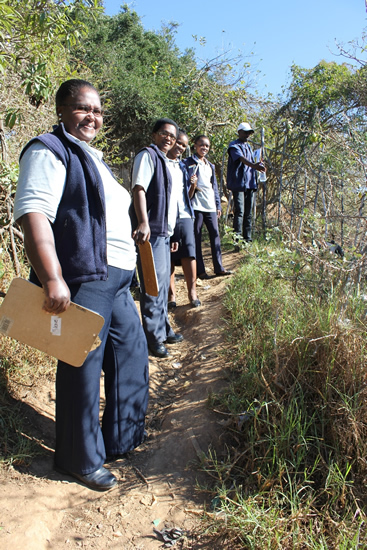 Bridgette Jacobs is a community health worker (CHW) who was part of the team that received an Impumelelo silver award for outstanding community work in Bridgeton, Oudtshoorn, in the Western Cape.
Bridgette Jacobs is a community health worker (CHW) who was part of the team that received an Impumelelo silver award for outstanding community work in Bridgeton, Oudtshoorn, in the Western Cape.
The team was recognised for their work in piloting a CHW National Health Insurance model that was developed for rural settings to promote community health and the prevention of illness.
Impumelelo identifies, rewards and promotes social innovation that improves the quality of life of the poor. It does this through an annual awards programme, case study research, policy analysis and master class training to promote replication.
The silver award was presented to the Department of Health in the Western Cape and supporting NPO Family and Marriage Society of SA (FAMSA) Karoo at the Impumelelo Gala Awards held in Cape Town.
On an average day, Jacobs visited about five families in the community, empowering them with health knowledge.
“I would enter a home and then introduce myself and ask questions from a form called a screening tool. These questions are divided into child health, mental health, women’s health, men’s health, HIV, Aids, and TB. Clients are then referred to the clinic depending on their answers,” she said.
She explained that the main priorities of the programme were health promotion and prevention, self-management, health screening and referrals, as well as basic care.
A total of 50 785 screenings were done, of which 3 636 people were referred to the clinic. This amounts to 7.1 percent of all screenings.
Due to its success, the programme has been implemented across the Eden district and was rolled out to all the rural districts in the 2016/17 financial year.
Since the pilot project began in 2014, 800 trainees have completed the one-year accredited training programme.
“The silver Impumelelo award is a recognition and celebration of the hard work and sheer determination of a team to overcome all challenges and find solutions for the challenges to realise a shared vision for the way forward to Healthcare 2030,” said Dr Helise Schumann, District Manager of Eden and Central Karoo Districts.
Beware of bogus colleges
Beware of bogus colleges lebangThe beginning of the year is a busy time for many young people who are desperate to study.
 As most people start the year with enthusiasm and New Year’s resolutions, the Department of Higher Education and Training (DHET) has urged prospecting students and parents to beware of the private institutions of higher education and training that are not registered.
As most people start the year with enthusiasm and New Year’s resolutions, the Department of Higher Education and Training (DHET) has urged prospecting students and parents to beware of the private institutions of higher education and training that are not registered.
Unfortunately, some of those who desire to further their studies end up enrolling with bogus tertiary institutions without knowing, leaving them with invalid certificates of higher education and money gone to waste.
How to identify bogus institutions
There are different types of education and training institutions in South Africa namely:
- Public higher education and training institutions.
- Private providers of education and training.
Public institutions include public universities, universities of technology, technical vocational education and training (tvet) colleges and community education and training colleges. These are state-funded institutions and are established by the DHET by means of legislation.
“They [public institutions] are deemed to be registered because they are established by law,” the department said.
All private providers of higher education and training in the country are required to be registered with it, according to the law.
“These institutions are required to display their registration certificate and make it available for scrutiny, on request by anyone.
If the institution cannot confirm or produce its registration certificate issued by the department, then the institution might be unregistered and the public must not enrol at such a institution and must further inform the DHET by using a toll-free call centre line: 0800 87 2222.
In the certificate of registration, the public must verify the name of the institution; the site of delivery; the programmes registered to offer; and the registration period of the institution.
The department says applicants must firstly verify with the DHET before enrolling at any private institution of education and training by calling the call centre numbers
above.
Members of the public are also advised to contact the department’s Career Development Services by SMS: send an SMS to 072 204 5056 with your question; send a “Call me back” to 086 999 0123 and one of the career advisors will call you back (Mon-Fri: 08h00 to 16h30); E-mail: careerhelp@dhet.gov.za / Visit Facebook: www.facebook.com/careerhelp, Twitter: www.twitter.com/rsacareerhelp or visit the website: www.careerhelp.org.za
Furthermore, the department said people may contact the Central Application Clearing House on toll-free number 0800 356 635 or SMS your name and ID number to 49200.
Steps to follow, to claim a refund
Students who are already victimised by these institutions are advised to request a refund from the institutions, and if they fail to reclaim their money they can approach the court.
Victims must also inform the DHET and get written confirmation from the department that the programme or college is not registered.
“For amounts up to R12 000, you can approach the Small Claims Court with the letter of confirmation from the department. For amounts above R12 000, you must engage an attorney, and students who cannot afford legal fees may approach the Legal Aid Board at 0800 110 110,” said the department.
For more information and to get a list of unregistered institutions visit: www.dhet.gov.za
Save money wisely
Save money wisely lebangStart the New Year on a high note by saving wisely in 2018. Saving is not only dependent on income, it is largely dependent on willpower and discipline. If you follow these tips 2018 may be a better year for you financially:
 1. Set a target: The reason why many of us do not save is because we do not have set targets. It is important to set and write down important savings targets, such as an emergency fund, holiday fund and other targeted savings. Do you know your targets?
1. Set a target: The reason why many of us do not save is because we do not have set targets. It is important to set and write down important savings targets, such as an emergency fund, holiday fund and other targeted savings. Do you know your targets?
2. Automated savings: Debit orders to savings accounts allow automated saving. you can set up debit orders tax free savings accounts (tfsa), 32 day notice accounts and unit trust accounts.
 4. Pension fund contributions: When starting a new job, ask your employer to default to the highest allowable retirement fund contribution percentage of your income. You can also ask your employer to review your current contribution.
4. Pension fund contributions: When starting a new job, ask your employer to default to the highest allowable retirement fund contribution percentage of your income. You can also ask your employer to review your current contribution.
6. Group savings: Start or join a stokvel or investment club with family and friends. The group will encourage you and enable you to develop the discipline required to be a regular saver.
7. Savings buddy: Allow your partner or friend to be a savings buddy who you meet with regularly to discuss your savings journey. By holding each other accountable, you can help each other to grow wealth.
 8. Baby gifts: You can seed a child’s future savings by requesting baby gifts of cash to deposit into TFSA or taking out a retirement annuity (RA) for a baby.
8. Baby gifts: You can seed a child’s future savings by requesting baby gifts of cash to deposit into TFSA or taking out a retirement annuity (RA) for a baby.
9. Children: Open TFSA accounts for all your children to maximise the benefit they receive from these accounts. Set up debit orders to contribute to these accounts as they grow up with cash gifts they receive on birthdays etc. You can encourage grandparents and other family to also contribute regularly.
10. Retirement fund statement: By receiving your retirement fund statements monthly or quarterly, you can be encouraged to keep track of your savings to ensure that you have sufficient income when you retire.
Source: www.savingsinstitute.co.za
Jobs: Justice and Constitutional Development Jan 2018
Jobs: Justice and Constitutional Development Jan 2018 Estelle GreeffCourt Manager
Reference: 17/79/KZN
Salary: R417 552 – R491 847 per annum. The successful candidate will be required to sign a performance agreement.
Requirements: Three (3) year qualification in Administration in (NQF Level 6) or National Diploma in Service Management (NQF Level 5) plus module in Case Flow Management or equivalent qualification; At least three (3) year’s managerial or supervisory experience; Knowledge and experience in office and district administration; Knowledge of the Public Financial Management Act (PFMA); Experience in managing Trust (Third Party Funds) and Vote Account; A valid driver’s licence; Experience in the Court environment will be an added advantage.
Enquiries: Mr JN Mdaka Tel: 031 372 3000
Closing date: 22 December 2017
Note: Interested applicants may visit the following website: www.justice.gov.za or www.dpsa.gov.za to view the full job specification of the above positions. Applications must be submitted on Form Z83, obtainable from any Public Service Department or on the internet at www.gov.za. A Z83 form & CV must be accompanied by original certified copies of qualifications, identity document and a driver’s licence where necessary.
A SAQA evaluation report must accompany foreign qualifications.
Applications that do not comply with the above mentioned requirements will not be considered.
Tel: 012 315 1111 Private Bag X81, Pretoria, 0001 Momentum Centre, 329 Pretorius Street, Pretoria
Jobs: Labour Jan 2018
Jobs: Labour Jan 2018 Estelle GreeffDeputy Director: Planning Monitoring and Evaluation
Centre: Supported Employment Enterprises, Silverton
Reference: HR 4/17/11/01
Salary: All Inclusive: R 657 558.00 per annum
Enquiries: Ms MM Moteme, Tel: 012 843 7300
Applications: Human Resources Management: Private Bag X 117, Pretoria, 0001 or hand deliver at 215 Francis Baard Street.
Assistant Director: UI Operations
Provincial Office: Kimberley
Reference: HR4/4/8/300
Salary: Commencing: R334 545 per annum
Enquiries: Adv. B Gwabeni, Tel: 053 838 1554
Applications: Provincial Operations: Private Bag X 5012, Kimberley, 8301 or hand deliver at cor Pniel & Compound Streets, Kimberley
Principal Inspector: BCEA
Provincial Office: Emalahleni
Reference: HR 4/4/7/54
Salary: Commencing: R 417 552.00 per annum
Enquiries: Ms NL Njwambe, Tel: 013 655 8775
Applications: Provincial Operations: Private Bag X 7263, Emalahleni, 1035 or hand deliver at Department of Labour, cor Hofmeyer Street and Beatty Avenue, Emalahleni
Applications must be submitted on form Z83, obtainable from any Public Service Department or on the internet at www.gov.za/documents. The fully completed and signed form Z83 should be accompanied by a recently updated, comprehensive CV as well as recently certified copies of all qualification(s) including a Senior Certificate and ID-document [Driver’s license where applicable]. Non-RSA Citizens/Permanent Resident Permit Holders must attach a copy of their Permanent Residence Permits to their applications. Should you be in possession of a foreign qualification, it must be accompanied by an evaluation certificate from the South African Qualification Authority (SAQA). Applicants who do not comply with the above-mentioned requirements, as well as applications received late, will not be considered. The Department does not accept applications via fax or email. Failure to submit all the requested documents will result in the application not being considered. Correspondence will be limited to short-listed candidates only. If you have not been contacted within eight (8) weeks after the closing date of this advertisement, please accept that your application was unsuccessful. Suitable candidates will be subjected to a personnel suitability check (criminal record, citizenship, credit record checks, qualification verification and employment verification). Where applicable, candidates will be subjected to a skills/knowledge test. All shortlisted candidates for SMS posts will be subjected to a technical competency exercise that intends to test relevant technical elements of the job, the logistics of which be communicated by the Department. Following the interview and technical exercise, the selection panel will recommend candidates to attend generic managerial competencies using the mandated DPSA SMS competency assessment tools. Successful candidates will be appointed on a probation period of 12 months. The Department reserves the right not to make any appointment(s) to the above post. The successful candidate will be expected to sign a performance agreement. The Department of Labour is an equal opportunity affirmative action employer. The employment decision shall be informed by the Employment Equity Plan of the Department. It is the Department’s intention to promote equity (race, gender and disability) through the filling of this post(s) with a candidate whose transfer / promotion / appointment will promote representativity in line with the numerical targets as contained in our Employment Equity Plan.
Looking for a government job?
Looking for a government job? Estelle Greeff Government jobs are advertised on the Department of Public Service and Administration website, www.dpsa.gov.za, in our Vuk’uzenzele newspaper, and in other reputable publications.
Government jobs are advertised on the Department of Public Service and Administration website, www.dpsa.gov.za, in our Vuk’uzenzele newspaper, and in other reputable publications.
Please be aware of any job offers that ask for any form of payment – you will never be asked to pay a fee to apply for any government job.
Websites: www.gcis.gov.za www.vukuzenzele.gov.za
E-mail: vukuzenzele@gcis.gov.za
Tel: (+27) 12 473 0405
Making access to justice a reality
Making access to justice a reality Estelle GreeffAdvertorial
Legal Aid South Africa continues to make access to justice a reality. Our brand may look different, but the excellent quality of our services has not changed.
 We are committed to helping as many people as possible access justice – our 128 offices can be found throughout South Africa, in both rural and urban areas.
We are committed to helping as many people as possible access justice – our 128 offices can be found throughout South Africa, in both rural and urban areas.
Our toll-free Advice Line (0800 110 110) is available weekdays from 7am – 7pm. If you cannot call us, you can now send us a Please Call Me on 079 835 7179 and we will call you back.
We are a certified Top Employer, for nine consecutive years now, and an Industry Leader in the Public Sector for three years in a row.
Legal Aid SA is committed to the responsible and accountable spending of public resources, as is evident from our 16 consecutive unqualified audits. We also had a clean audit report in 2016-2017.
Through our offices and Advice Line, we helped 767,656 people in 2016-2017:
We served 444,962 people in new civil and criminal matters.
We provided legal advice to 322,694 clients; nearly 6, 000 more people than the previous year.
We helped 18,025 children in civil and criminal matters.
Through our Impact Litigation Unit, we finalised 15 matters and took on 13 new ones, which benefit countless members of the public.
When we discovered that the school attended by eight children living in a children’s home was sending them home as they did not have birth certificates, nor legal guardians or foster parents, we intervened. Legal Aid SA ensured that the children were allowed access to the school and placed them in the care of four foster mothers. We have committed to working with the children until their rights are fully upheld.
An elderly couple turned to us for help when their bank threatened to take their home away.
Our assistance ensured that they kept their home and that the remaining debt on the home was written off, as the initial mortgage bond was found to have been issued irresponsibly by the bank.
In the case of a student nurse enrolled to perform practical training at a provincial hospital, we ensured that the right to be treated equally is protected. She belongs to the Muslim faith and in terms of her religion, is expected to cover her hair in public by way of a headscarf. The hospital management refused to allow her to wear the headscarf on the basis that it is against hospital policy. The argument Legal Aid SA presented on behalf of the client was that her wearing the headscarf does not conflict with the objective of the policy as it is not a health risk nor does it taint the reputation and dignity of the nursing profession. The conduct of the hospital amounts to unfair discrimination based on the religious practices and beliefs of our client. The Equality Court agreed with our argument and ordered that the Nurse’s Welfare Policy be reviewed to bring it in line with our country’s constitutional values.
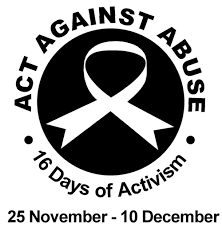 Legal Aid SA is independent and defends and represents its clients without fear or favour.
Legal Aid SA is independent and defends and represents its clients without fear or favour.
You can turn to us if you are:
- Facing eviction
- Having problems with your employer
- Involved in a family dispute
- Accused of a crime
- Dealing with a contractual issue
- A community that needs legal help
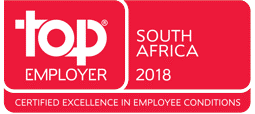 We are your voice for justice.
We are your voice for justice.
We are here to help you.
Know your rights
Know your rights Estelle GreeffAdvertorial
Statistics tell a frightening story of women and children of all ages facing terrible circumstances, at home, at school, and in the workplace.
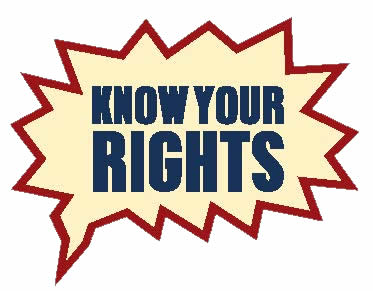 While many commentators during the 16 Days of Activism for No Violence Against Women and Children focused on the problems we face in fighting the scourge of violence against women and children in this country, Legal Aid SA would like to start proposing solutions.
While many commentators during the 16 Days of Activism for No Violence Against Women and Children focused on the problems we face in fighting the scourge of violence against women and children in this country, Legal Aid SA would like to start proposing solutions.
Where do we start in changing this?
Learn about your legal rights, and encourage others to do the same. How do you do this? Call our toll-free Advice Line on 0800 110 110 for professional legal advice, at no cost. If you cannot call, send a Please Call Me to 079 835 7179 and we will call you back. Knowing your legal rights empowers you and will enable you to put your rights first.
Legal Aid SA is a leader in the provision of legal advice and civil representation, especially protecting and defending the rights of women and children. Our focus on fulfilling our constitutional mandate, and meeting our promise of being your voice, for justice, motivates us to assist even more women and children facing abuse, in a number of forms.
In one of our matters, our legal practitioner Jaylynne Hillier was called in to represent a boy who was reported to be disruptive and uncontrollable by his mother. A social worker who was appointed to investigate the child’s home circumstances and behaviour recommended that the child was not in need of care and protection, citing that the boy had casually used dagga but had stopped.
After conducting her own investigation into the child’s behaviour and drug use, Hillier interviewed the boy, who then confessed to using tik, mandrax, alcohol and dagga. When interviewing the boy’s 10-year-old sister, Hillier asked more about their home and family circumstances and was told that the sister was being sexually assaulted by their father. She also said that she had informed their mother who reported this information to a social worker but the case was not investigated further. The boy confirmed that his drug use stemmed from witnessing his sister’s abuse, and that when he confronted his father, he would threaten him. Hillier immediately moved for an order that both children be moved into temporary safe care and for the boy to be admitted into a drug rehabilitation programme. She also requested an order that the father would not be allowed to enter the home where the children were. The Court granted both orders.
Both the son and daughter have been reunited with their mother and the father may still not enter the family home or have any contact with the daughter.
Your voice. For justice.
This is a stamp of promise from Legal Aid SA to those who have been rendered voiceless, that we will go to great lengths to ensure that you do not go unheard, nor unrepresented. We call on women and children to seek our legal advice and representation in civil and criminal matters, during these 16 days and beyond. Visit our qualified legal practitioners at any of our 64 Offices and 64 Satellite Offices, which are spread across the country.
Legal Aid SA wishes to see a society that has a clear knowledge of its legal rights and obligations – we are your voice for justice and we are here to help you.
Agreements to boost SA/Angola relations
Agreements to boost SA/Angola relations lebangInternational relations / Africa news
South Africa has affirmed its historic ties with Angola, and both countries agreed on visa-free travel.
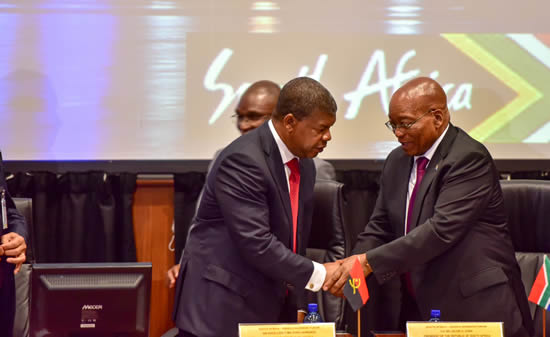 South Africa and Angola have signed several agreements which will boost trade and promote people-to-people contact.
South Africa and Angola have signed several agreements which will boost trade and promote people-to-people contact.
The two countries signed agreements to escalate the bilateral mechanism to the level of the Bi-National Commission (BNC) which will be presided over by the Heads of State. They also signed agreements on a visa waivers for ordinary passport holders, police co-operation and customs matters.
The two countries said the BNC will bring the required momentum to consolidate and deepen bilateral relations in various areas of co-operation.
The visa waiver for ordinary passport holders will facilitate easy movement of people between the two countries. It will enable citizens entry for a period of 90 days a year, provided that each visit does not exceed 30 days in total.
This development will have a positive effect on business and leisure tourism and will open the door for future trade and foreign direct investment.
“It will not only add significant impetus to tourism, but will also further promote people-to-people contact,” said President Jacob Zuma.
He was speaking shortly after official talks with his newly-elected Angolan counterpart, President João Manuel Lourenço who was on his first state visit to South Africa.
“We welcome the agreements that we have just signed. They are all critical to enhancing bilateral co-operation,” said President Zuma.
President Lourenço said the signing of the agreements will “certainly change the way that the countries have co-operated before”.
The two countries greed to prioritise economic co-operation through trade and investment in order to grow the respective economies and thus create job opportunities.
This will be done by paying special attention to untapped sectors such as agro-processing, energy, mining and cultural co-operation.
“We are coming to South Africa with a sense of humbleness because we know in terms of the economy, South Africa is way ahead of Angola. We are seizing this opportunity to also extend an invitation to the South African business sector to go and invest in Angola,” said the Angolan President.
Migrant ‘slave market’ condemned
Migrant ‘slave market’ condemned lebangInternational relations / Africa news
South Africa has joined the international community in condemning the auctioning of African migrants in Libya as slaves.
 South Africa said these inhumane acts are not in line with the ideals of the African Union and relevant African and international instruments, including the African Charter on Human and Peoples’ Rights.
South Africa said these inhumane acts are not in line with the ideals of the African Union and relevant African and international instruments, including the African Charter on Human and Peoples’ Rights.
“South Africa calls for an immediate end to these atrocities and other criminal acts of human trafficking,” the Department of International Relations and Cooperation (Dirco) said.
Recent footage showing migrants from Ghana, Nigeria, Cameroon, Zambia, Senegal, Gambia and Sudan being auctioned off like slaves in Libya, which is a transit hub for Europe-bound migrants and sent shock waves across Africa.
Over 100 000 migrants from Africa and the Middle East are making dangerous trips across the Mediterranean to Europe every year and has evolved into a humanitarian crisis in recent years. With the political instability in Libya, it is seen as the main gateway for people attempting to reach Europe by sea.
According to the United Nations High Commissioner for Refugees, over 148 200 migrants and refugees used Mediterranean routes to enter Europe in the first nine months of 2017 and 2 700 people reportedly died in the process. Many others were exposed to abuse, human trafficking and enslavement.
In the wake of the reports of the atrocities in Libya, authorities there have announced that they will set up a transit and departure facility in Tripoli for refugees and migrants in need of international protection – an initiative that offers viable alternatives to their dangerous journeys along the Central Mediterranean route.
The initiative, which is supported by the Italian government, will facilitate the transfer of thousands of vulnerable refugees to third countries.
South Africa has welcomed this announcement, which will also see authorities investigating and identifying the perpetrators of these criminal acts, as well as their accomplices.
Dirco said it looks forward to a transparent and credible investigation.
“Publishing the outcome of the investigation will be the most prudent and welcome thing to do by the Libyan authorities. We further urge the Libyan authorities to do everything in their power to improve the conditions of African migrants in the camps meant to house migrants on their territory,” the department said in a statement.
South Africa indicated that it will continue its work to eradicate human trafficking and support international efforts to bring those who abuse vulnerable people to justice.
“We will continue to champion the respect for human rights, especially those of our fellow African brothers and sisters.”
This month in history
This month in history lebangThe Proteas become the first South African team in history to win a Test cricket series in Australia
Monday, January 5, 2009
The current South African national cricket team, The Proteas, is one of the most successful national teams in the country and the world. Their record in test cricket is quite outstanding for such a young team.
They are currently ranked number one in the world in both ODI and Test cricket.
In 2009 they made history when they became the first ever South African team to win an away test cricket series in Australia.
The year proved to be a successful one for the Proteas, being undefeated in 10 Test matches.
Source: www.sahistory.org
Bioscope magic revived
Bioscope magic revived lebangSport, arts and culture
The golden age of bioscope is back for a short time so be sure not to miss out on this old-fashioned magic.
 The Gauteng Film Commission (GFC) invites people to sit back and relive the heydays of cinema this festive season.
The Gauteng Film Commission (GFC) invites people to sit back and relive the heydays of cinema this festive season.
Currently under way across the province is the GFC’s school holiday programme, which runs until 20 January 2018.
Fifty films will be screened across all areas of Gauteng. The GFC has vowed to revive the now extinct bioscope culture that lost its prominence with the introduction of broadcast television.
The programme caters for all age groups and has a multi-prong focus of entertainment and training, through focus group workshops.
Gauteng Film Commission communication manager Siyabonga Mngoma said bioscope evolved from the long-standing African tradition of storytelling. The Eyethu cinema in Soweto and other cinemas around townships throughout South Africa were pioneers in audience development.
“The programme aims to share insights with young aspirant filmmakers regarding the film and TV industry, enhance audience development and foster an appreciation of locally produced films,” said Mngoma.
It also seeks to empower the Gauteng youth, with an emphasis on careers in the film sector and internship programmes.
The initiative will also showcase Gauteng as a film-friendly city region for both the development of the industry and the promotion of the city as a preferred production location. The GFC develops, promotes and co-ordinates the film and television production industry in Gauteng.
Under the leadership of the Department of Sport, Arts, Culture and Recreation, the agency is tasked with positioning the province as a world-class destination for film-making as well as attracting local and international investments in the film and television industry.
The GFC’s core business is to facilitate and enhance the contribution of the industry to the economic growth of the province. “We also act as a centralised industry intelligence hub and ensure that people across Gauteng can experience the magic of cinema.”
The organisation works with industry, government agencies and other key stakeholders, advising on the development and growth of a sustainable audio visual industry.
For more information on the school holiday film programme log on to the GFC’s social media pages: on Twitter - @GautengFilmCom, Facebook – Gauteng Film Commission and website – www.gautengfilm.org.za
Happy ending for Northern Cape writer
Happy ending for Northern Cape writer lebangSport, arts and culture
A provincial festival brings together aspiring writers, published writers and publishing houses.
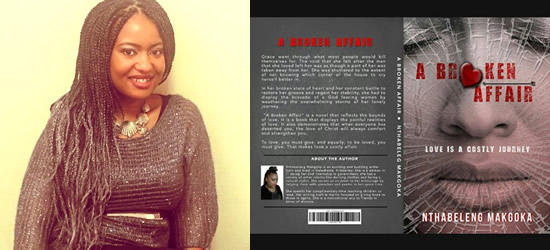 A 30-year-old Kimberley woman felt the thrill of success recently when she held in her hands a book that she had written.
A 30-year-old Kimberley woman felt the thrill of success recently when she held in her hands a book that she had written.
Nthabeleng Makgoka received R43 000 in sponsorship from the Northern Cape Department of Sport, Arts and Culture and was given a platform to launch her book at its ninth Writers Festival hosted at the Sol Plaatje University.
“The realisation of knowing that the first step to fulfilling my dream as a writer has come true was motivating enough to write and work harder. Secondly, knowing the financial burden of putting my work out there has been paid off was a big relief,” said Makgoka.
Her debut novel is about a young lady named Grace who takes a spiritual journey to heal from a failed affair. Her journey is difficult and lengthy but she is determined to withstand the storm by all means possible by focusing on her businesses, her parenting skills, her career and, above all, her relationship with God.
Makgoka, who studied Information Technology at the Central University of Technology in the Free State, discovered her passion for writing in 2006 when she started penning poems for loved ones.
A compilation of short stories and a children’s book are next on her agenda.
Makgoka said that the department is doing a good job of bringing together like-minded people to network and share their experiences.
“Hosting creative writing workshops which enhance our writing skills is a step in the right direction,” she said, sharing that she met her publisher at a writers festival.
MEC of Sport, Arts and Culture Bongiwe Mbinqo-Gigaba said literature is a powerful tool for social dialogue, social cohesion and nation building.
“We have entered into a partnership with Sol Plaatje University to promote the development of literature, indigenous languages and the development of capacity to sustain reading and writing activities in the Northern Cape,” she said.
MEC Mbinqo-Gigaba said the partnership with the university has resulted in progressive creative writing workshops being held throughout the province for aspiring local writers and poets.
“As the custodians of our nation’s heritage, it is the responsibility of the Department of Sport, Arts and Culture to promote the culture of reading and writing and develop a sustainable book publishing industry that encourages equitable development of all South African languages.”
She said writers have an important role in society because they are the conscience of the communities.
“They chronicle our stories. They remind us of where we come from. They help us better understand the present and thus shape future perspectives of our society. They amplify the wishes, the aspirations and the cries of the people.”

